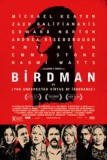| Reviews & Columns |
|
Reviews DVD TV on DVD Blu-ray 4K UHD International DVDs In Theaters Reviews by Studio Video Games Features Collector Series DVDs Easter Egg Database Interviews DVD Talk Radio Feature Articles Columns Anime Talk DVD Savant Horror DVDs The M.O.D. Squad Art House HD Talk Silent DVD
|
DVD Talk Forum |
|
|
| Resources |
|
DVD Price Search Customer Service #'s RCE Info Links |
|
Columns
|
|
|
Birdman or (The Unexpected Virtue of Ignorance)
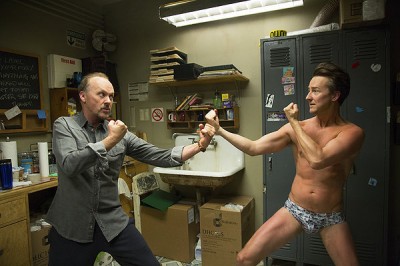
"Did you ever get the feeling you've been cheated?"
That's the line that popped into my head as I left the theater after watching Birdman or (The Unexpected Virtue of Ignorance). It kind of arose spontaneously as I was wrestling with my initial reaction to a film that I feared had lost me in its final quarter. I was still hoping to maybe straighten those feelings out, to find whatever it was that was eluding me about how the story had turned out, but instead of the missing connection, I kept hearing, "Did you ever get the feeling you've been cheated?" At the time, I couldn't even place where it was I was lifting the question from. I punched it into Google when I got home, and up popped an infamous video of John Lydon exiting a Sex Pistols gig after playing less than a minute of a single song. The tune was "No Fun." How fitting.
To a degree, at least. Since for about 80 or 90 minutes, Birdman is good, heady fun with a virtuoso filmmaking style and dynamite performances. Then for the last half hour, it's a lot of squelchy philosophy and narrative flailing as its various pieces malfunction and fall by the wayside. Guitar, bass, drums, and oops, there goes the singer.
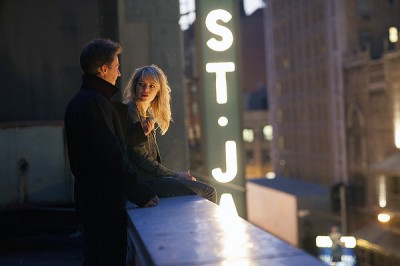
Birdman is the latest brainchild of Alejandro González Iñárritu, the filmmaker behind 21 Grams, Babel, and Biutiful. I should be fair and point out that with each of his previous films, I have enjoyed Iñárritu's work less and less, with 21 Grams being the only movie I liked outright. Birdman is now my second favorite, and I thought it would put me back in cahoots with what I think is a smart, well-meaning artist. Alas, we got close, but don't make brunch reservations for the two of us just yet.
Michael Keaton stars in the film as Riggan, an aging actor who was famous in the 1990s for playing Birdman, a winged superhero who fought crime long before the comic book craze hit the silver screen. Since bailing out ahead of Birdman 4, Riggan's life has been in a tailspin. Looking to get back in the public eye and out from under the mask of his onscreen persona, Riggan is starring in and directing a theatrical adaptation of Raymond Carver short stories that he wrote. It's an ambitious undertaking, and Iñárritu's film opens on the eve of the play's first public preview. Riggan is nervous, especially when his male co-star (Jeremy Shamos, Magic in the Moonlight) is injured and unable to return to the cast. A glimmer of hope emerges: one of the actresses in the play (Naomi Watts, St. Vincent) is dating one of New York's most revered bad boy thespians, Mike Shiner (Edward Norton, Moonrise Kingdom). Shiner is willing to step in, but he won't make the transition an easy one.
What follows are several tumultuous nights where Riggan grapples with his temperamental cast, a contentious press, and also personal issues. The other actress in his play, Laura (Andrea Riseborough, Oblivion) thinks she may be pregnant with Riggan's baby, and Riggan's daughter, Sam (Emma Stone, Zombieland), fresh out of rehab, is working as his assistant.
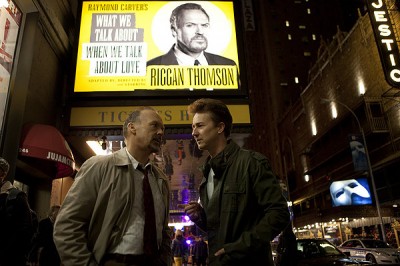
Oh, and did I mention that Riggan hears the raspy voice of Birdman in his head, and its been pushing him to man-up and reclaim his wings and cowl? And that Riggan may actually have telekinetic powers? Iñárritu is playing an elaborate metatextual joke here, relying on our memory that Michael Keaton was many people's first version of Batman, a role that could be considered the apex (and ruin) of his career. It's all part of a larger comment on the current state of cinema. There are multiple references to other actors who have played or are currently playing superheroes, and who are making bank and earning accolades for doing so. (I'm sure it's no coincidence that Iñárritu also cast a one-time Incredible Hulk (Norton) and Spider-Man's girlfriend (Stone)). For the most part, the jabs are thrown with a sly sarcasm rather than a sneer, and the comic book movies are only one layer of a multi-faceted satirical view that pits the "legitimate theatre" against flash-in-the-pan celebrity culture.
This massive jumble of plotlines and characters could have easily gotten away from Iñárritu, but his level of craft and facility with narrative threads carries the day here. For other filmmakers, his decision to film the scenes as long, unbroken takes, with mostly imperceptible cuts between them, would possibly be the one last conceit to break the metaphorical camel's back, but Iñárritu rather smartly uses this approach to keep everything tight. The added choreography means he must know where each player is at all times, where they are going, and how they are getting back. It's dazzling to watch. The director even pulls a little bit of a bait-and-switch by utilizing a percussive jazz score, written by first-time film composer Antonio Sanchez, that not only propels the action but creates an illusion of improvisation. Birdman continually feels like it is happening just as you are watching it.
The theatricality of the filming also helps to give buoyancy to the simulacrum of a theatrical production that exists within Birdman. Despite ostensibly being about a fading movie star, Birdman is really a backstage drama, with all the machinations of personality these kinds of stories generally entail. Iñárritu plays a lot of the clashes and pretentions for laughs, amplifying them to an exaggerated level very near to parody. This includes hitting some tangential buttons located somewhere off the main board, such as the scene where Riseborough and Watts start making out for no real reason. Not even Mulholland Drive is safe from skewering! Iñárritu is pretending to meet our expectations, only to burst them.
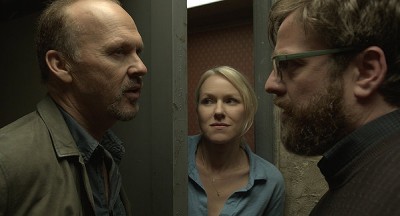
For their part, the cast is as up to the challenge as their captain. They know their lines and hit their marks and are all very, very good. (Iñárritu keeps in a take where Zach Galifianakis, playing a kind of straight man to Keaton's loon, flubs a line; it too works within the moment.) Norton hasn't been as cocksure and insufferably likeable since 25th Hour, and if the metatext holds true, he helps bring something out of Keaton in the same way Shiner does with Riggan. Keaton is a powerhouse, digging through Riggan's psychological muck to dredge up every chunk of ego and vulnerability he can find and then mashing them together. The actor gets a couple of raw, honest moments here, usually when his character is forced to make a genuine assessment of himself in front of others.
So, where does it all go wrong? Because I'll admit, right up to here, my review of Birdman or (The Virtue of Ignorance) is almost overwhelmingly positive. Where Iñárritu began to lose his grasp on me as a viewer is rather easy to pinpoint, actually. It's right around when he decides to start explaining his intentions in the most obvious language. It starts to happen when Riggan confronts the film critic, Lindsay Duncan (About Time)--though, admittedly, I might just be sensitive about that, as Iñárritu could very well be using Riggan to shout at me for the last couple of notices I gave his efforts. (Kidding!) Things steadily decline the morning after. Following a bender, Riggan embraces his psychoses, slipping deeper into what may or may not be fantasy, and Iñárritu abandons all faith in the intelligence of his audience and uses the Birdman consciousness to lay out everything he's intending to say. From then on, it's a series of one misstep after another, leading to a false ending, and then an even worse ending, and a sense that, once again, the director has tried to take on too much and cram it into too little. There seems to be no end game here, no great epiphany, just a hollow truth at the end of an ever-narrowing tunnel. The macro becomes the micro, the individual prevails, but to little avail; all the technique suddenly feels like trickery, a sleight-of-hand to distract us from the fact that there is nothing behind the curtain. Birdman doesn't conclude, it merely ends, with the bitter truth being that Riggan is the victim of the ironic outcome of an action he never would have taken in the first place, leading to an unearned triumph that is as pat as it is smug. The actor isn't allowed to transform into the character we've been promised; rather, his newfound self-assurance is overtaken by his author's fumbling philosophies. His actions aren't redemptive, they're just convenient. If the critique is that the public will accept anything, then why not take part and give them the easiest possible out? What a con!
I'm sure the film's defenders will begin their defense by suggesting that I didn't understand it and help me out by explaining what it all means. That will be unnecessary. I get how the outcome of the story is intended to offer some liberation and peace, almost like a grown-up fairy tale (and not really at all like a comic book), but I didn't find that Iñárritu took me there along with Riggan. Rather than finding my own sense of meaning in the character's fulfillment, the further I walked away from the cinema, the emptier I felt. Birdman, as well made as it is, is merely hokum dressed in a fancy costume. It has form, but no substance. Its display of talent promised me something more, but its dime-store philosophy left me vacant.
So, I ask again, have you ever had the feeling you've been cheated? Because I sure have.
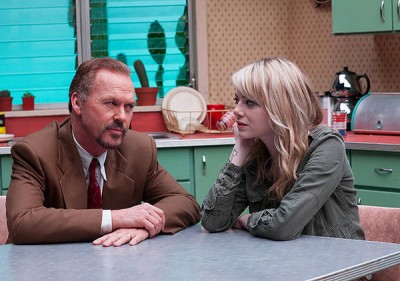
Jamie S. Rich is a novelist and comic book writer. He is best known for his collaborations with Joelle Jones, including the hardboiled crime comic book You Have Killed Me, the challenging romance 12 Reasons Why I Love Her, and the 2007 prose novel Have You Seen the Horizon Lately?, for which Jones did the cover. All three were published by Oni Press. His most recent projects include the futuristic romance A Boy and a Girl with Natalie Nourigat; Archer Coe and the Thousand Natural Shocks, a loopy crime tale drawn by Dan Christensen; and the horror miniseries Madame Frankenstein, a collaboration with Megan Levens. Follow Rich's blog at Confessions123.com.
|
| Popular Reviews |
| Sponsored Links |
|
|
| Sponsored Links |
|
|
| Release List | Reviews | Shop | Newsletter | Forum | DVD Giveaways | Blu-Ray | Advertise |
|
Copyright 2024 DVDTalk.com All Rights Reserved. Legal Info, Privacy Policy, Terms of Use,
Manage Preferences,
Your Privacy Choices | |||||||









